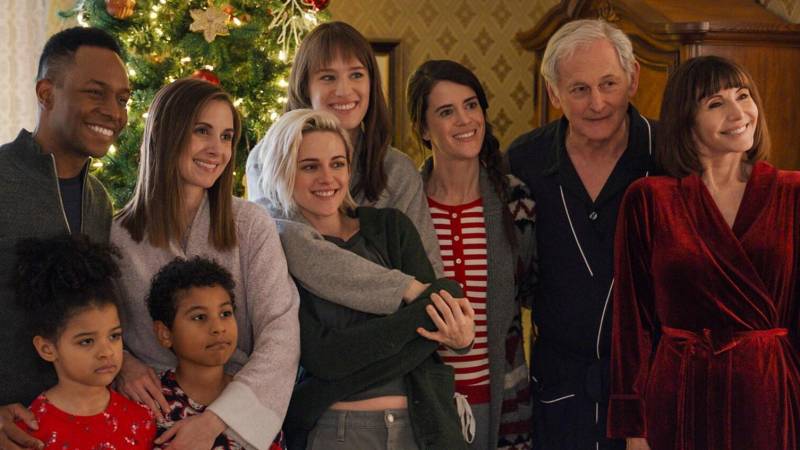The holiday family romcom tends to go a certain way. The loving parents are having some kind of troubles (medical? financial? marital?) that they haven’t fully shared. The kids come home for the holidays, and they have their own things going on: they’re not ready to reveal a breakup, or they’re not happy about running into an ex, or they’re looking to introduce a new partner for the first time.
Happiest Season on Hulu is a variation on this oft-used theme, not that there’s anything wrong with that. Harper (Mackenzie Davis) is bringing her girlfriend Abby (Kristen Stewart) home to meet the family: father (Victor Garber), mother (Mary Steenburgen), nasty striver sister (Alison Brie), and needy middle sister (Mary Holland). The family will have to find some way to welcome Abby and ring in the holidays, right? And the sisters will all have to figure out a way to love each other? And we’ll learn that all these people have their own sadnesses? Sure. The complication is this: Not only has Harper’s family not met Abby, but they don’t know that Harper is gay, so when she brings Abby home, it’s on the pretext that Abby is just her roommate and pal.
Now, the film goes to some lengths to try to create circumstances under which this could happen (because … why would you bring your girlfriend home if you weren’t out, and why would she go?), and they’re not terribly convincing, but that’s okay. Everybody is different, after all, and a little bit of going with the flow is very much expected in holiday movies and romcoms and especially in holiday romcoms. Once Abby gets there and understands the situation, she starts explaining it on the phone to her friend John (played by Schitt’s Creek‘s Dan Levy), who coaches her about how to handle it, much like Lil Rel coached Daniel Kaluuya in Get Out. There are some comedic set pieces, there’s some warm family business, and there’s Aubrey Plaza playing Harper’s ex, Riley, who plays a significant role in revealing how Harper got into this situation in the first place.
The biggest challenge is that the character of Harper is … opaque, for lack of a better word. Her motives are a little hard to understand some of the time. That’s emphatically not because she’s not out to her parents—the film, directed by Clea Duvall, is sensitive about explaining explicitly that people not being out to their families doesn’t reflect poorly on them, and it doesn’t mean they don’t love their partners. But the particular ways Harper treats Abby, and the situations she puts Abby in, strain the necessary part of this story in which you root for this couple. Nobody wants to follow a romance that you sense will end with a couple together while increasingly thinking that … maybe they should break up? I never reached that point with Happiest Season, but I wobbled a few times.

9(MDAxOTAwOTE4MDEyMTkxMDAzNjczZDljZA004))

